There is a surprising amount of water heater inertia in our area -- we are clinging to old-style heaters. I’ve been scratching my head about it. Mid-peninsula residents have been quick to adopt all kinds of clean tech, like EVs, solar panels, smart thermostats, LED lights, and more. We care about climate change and we want to do our part, especially when it involves cool new technology and some beefy incentives.
We’ve got all that going on with new-style water heaters, yet adoption is lagging. Heat pump water heaters greatly reduce emissions while using 3.5-6 times less energy than gas water heaters, but still we persist in firing up the gas to heat our water, boosting our home’s carbon footprint by about 50%. (1) What’s up with that?
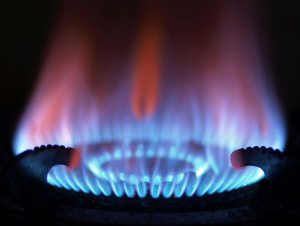
Flame under a gas-tank water heater
This is the first in a two-part series about heat pump water heaters, which I hope will help answer that question, demystify the heaters some, and encourage more of us to give them a good look. In this first part, we are going to go on a virtual tour of some real life local installations after a brief overview.
Below is a picture of two Rheem water heaters. They look pretty similar, but the one on the left hooks up to gas and works like a gas stove, while the one on the right plugs into the wall and works like a refrigerator (in reverse). From this description, it’s hard to imagine that we’d care so much about which one we got that we’d choose the one that’s much, much worse for the climate (on the left).

A gas-powered tank (L) and an electric heat pump (R), images courtesy of Home Depot
They look about the same. They’re about the same size. And they’re both available at Home Depot. The one on the right is much more expensive, but there's a hefty local rebate and the bills are a little lower (2).
I asked some people who understand these water heaters why there seems to be a lot more interest in EVs than in heat pumps. I got a really interesting range of answers.
1. They are invisible. Since people can’t see these, unlike EVs and solar roofs, it’s hard to know who else has one, how “normal” they are, and if your friends and neighbors are buying them. People don't talk much about their water heaters, so it's hard to learn about them.
2. They are invisible. A different take on their invisibility is that since people can’t see them, there is less social pressure to get one, to show your friends that you aren’t burning gas for your showers. You can’t “virtue signal” with a water heater.
3. The installers are the problem. The “influencers”, the installers, contractors, architects, and builders, are conservative, with a “Go with what you know” attitude. Josie Gaillard, an Environmental Quality Commissioner in Menlo Park, estimates that “80% of installers will try to talk you out of it.” We certainly don’t see that with EV sales.
4. The installers are the problem. An informed take on the reason for installer pushback is that there are few qualified installers. Zach Liske, who owns a company that represents clean energy product manufacturers, said installation is “the bane of the industry. There are few trained installers. Our culture dissuades young people from going into the trades, and the diminished unions aren’t doing any training. So techs aren’t trained and there’s no place for training.” (His company, Flow Tech, is helping to fix that.)
5. Electric work is needed. Most heat pump water heaters need a 240V circuit and possibly other electrical work, though it can be reduced with the right choices. This means that the fuel switching can take longer and cost more to install. Update (July 2022): Rheem now has two 120-volt models available.
Interestingly, I heard a pretty different list when I talked with people who aren’t particularly familiar with these water heaters. They echoed questions about cost, but also raised concerns about placement and noise. I am going to address placement and noise below, and cost in a follow-up blog. For now I’ll just say that these need not be major obstacles in most cases. The trick is to find a qualified installer and minimize your electrical work.
A Virtual Tour of Heat Pump Water Heaters
Before delving into more tips and pointers, I want you to see what they look like in our homes, how they have been installed..
Some installations look like this one in Barron Park, where the heat pump water heater replaced a gas water heater in a small closet. In this particular case, a garage had been converted to a family room years ago, and space for the gas tank water heater was carved off in a small closet.
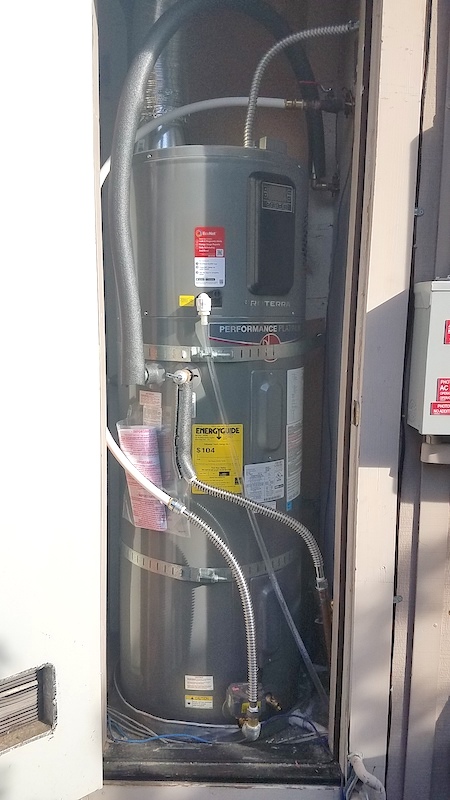
50 gallon heat pump water heater in exterior closet
The main elements of the water heater are shown in the annotated photo below.
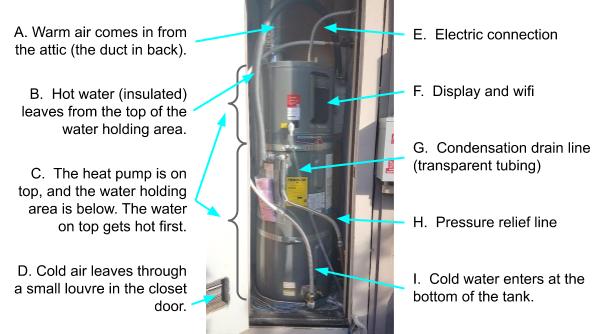
The heat pump draws in air, extracts the heat (with the help of a refrigerant) to warm the water, and blows out cooler air. You can see in this installation that the air intake is drawn from the attic (A), where the air is generally warmer than it is outside. That makes the heat pump more efficient. The cooler air that is emitted leaves through a small vent in the closet door (D).
You can also see that the top portion of the appliance holds the heat pump and the bottom part holds the water (C). The hot water floats on top of the cold water, so the pipe carrying hot water out leaves from the top of the water area (B), and the cold water coming in enters at the bottom (I). This allows a user to draw hot water from the tank even when all the water is not yet hot.
A few additional lines leaving from the tank include a condensation line (G) and a relief valve line (H). The water heater needs to be placed somewhere where these can drain (in this case through the exterior wall).
You can listen to the sound that this tank makes here. The heat pump is turned off towards the end of the 15-second clip, so you can hear the difference. It is a low, steady sound, something like a microwave might make. This heat pump is rated at 49 decibels. It is located adjacent to a room where the homeowners like to listen to music and watch TV. The wall is not insulated (it is actually a hollow door that separates the two), and they could hear the hum inside, sounding like one of the speakers might be on. So they adjusted the schedule of the heater so it didn’t go on in the evening when they are in that room.
Below is a picture of a similar installation, this one in Midtown.
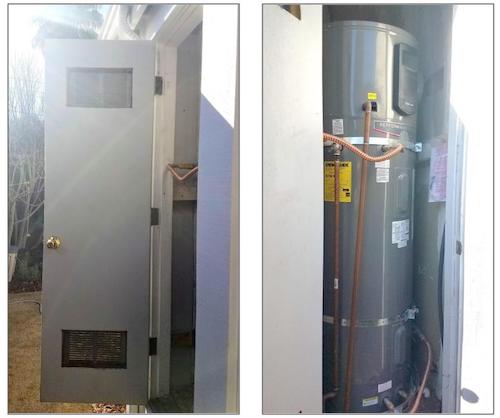
80 gallon heat pump water heater installed in exterior closet
In this case, both the air inflow and outflow are through louvres in the door and adjacent exterior wall (not shown). I asked the homeowner if she had adjusted the schedule, and she confessed that she hadn’t even downloaded the app. “It just works” was her overall impression. She said that if she listened for the hum she could hear it inside, but it was really not noticeable (unlike the wine refrigerator they had installed…). She also mentioned that her family of four, with two teenage boys, never runs out of hot water. In fact, at one point they had five houseguests and they still did not run out of hot water, though they were thoughtful when planning their showers. This installation has an 80-gallon tank. (BTW, can you see one oversight in this installation that would make it more efficient?)
Other installations I looked at had the heat pumps in the garage. Below are a few examples. The older model on the left has water inflow and outflow from the top of the tank. The middle one is a more complicated setup due to a solar hot water installation. The one on the right has been in some real-world tours, as you can see from the signs!

50 gallon heat pump water heaters of various vintages installed in garages
Two of the homeowners mentioned that their garage is cooler when the heat pump is running, which can be great in the summer and less great in the winter if you are working in your garage. You can hear the sound of the middle pump and the right pump. (We were not able to turn off the pump in that first video.) The GeoSpring heat pump on the left is the loudest of the three and is the oldest model, though good wall insulation meant it was not noticeable inside.
Tips from Heat Pump Water Heater Installers
As far as I can tell, the installations are pretty straight-forward. You need access to a 240v circuit and a place for drainage. If the heat pump is located near a sound-sensitive space, the homeowner can set a schedule or add some insulation or soundproofing to the adjacent wall. Maintenance is minimal, with an easy-to-access air filter that could be cleaned out every year or so. And the garage or utility closet feels safer with one less gas appliance. The most important tips that I heard from installers were:
- Plan ahead. Some installations cannot be done in a matter of hours. A 240V circuit with adequate current is sometimes easy to set up but sometimes more involved. Finding a good space for the heater can take some time if you currently have a tankless version. Home Depot or your contractor may not have the heat pump heater that you want, since these are still relatively new. Look into replacing your water heater before it fails, for example when it is 8-10 years old. Or at least set up the appropriate circuitry. The longest lead time (and expense) happens if you need to upgrade your electrical panel. That can take months, but fortunately it is rarely necessary, especially with newer low-powered options.
- Choose a model that uses only 15 amps. This will make it easier for the heat pump water heater to fit into your electric panel. There is almost no downside to the 15-amp models. Menlo Park Environmental Quality Commissioner Tom Kabat insists “California should just outlaw the 30 amp models.” Kabat has developed considerable skill in finding room in electric panels. You can learn more about his tips in this video. You can also download Kabat’s “Watt Diet Calculator” spreadsheet. (3)
- Consider a 120-volt model. If you live in a temperate climate, one of Rheem's two new 120-volt models might make sense for you. These significantly reduce the electrical installation work needed. One model works with any standard electrical outlet, and one requires a dedicated 120-volt 15-amp circuit. They may take longer to refill than the 240-volt models but to mitigate that, one model has an extra large compressor for faster refill speed, and the other (Hydroboost) model has a mixing valve (see below) to reduce the emptying rate. Review the specs to see if one of these is a good fit for you.
- Choose a larger size than you might normally choose. Since heat pump water heaters warm water more slowly than a gas-fired water tank, additional gallons can serve as a buffer.
- Consider installing a mixing valve. This allows you to heat your water to higher temperatures and then mix the extra-hot water with cold on the way out, effectively increasing the size of your tank. (4) It also allows you to schedule the tank to run during cheap electricity hours and then have it idle during the more expensive hours, though in practice the hot water won’t lose much heat over the expensive period anyway.
Installers, Rebates, and Costs
You can find plenty of information from your local utility about heat pump water heaters and rebates:
- Silicon Valley Clean Energy has a helpful guide linked from their webpage. They offer a $2000 rebate to replace a gas heater, plus an additional $1500 if you need to upgrade your panel.
- Peninsula Clean Energy’s webpage is here. They offer a $2500 rebate (you need to use a BayRen-approved contractor), plus an additional $750-$1500 if you need to upgrade your panel.
- The City of Palo Alto provides information here. They offer a $1200-$1500 rebate.
Silicon Valley Clean Energy has a terrific spreadsheet of installations that you can download to get an idea of contractors and prices. (I will discuss costs in more detail in the next blog post.) The Bay Area Regional Energy Network (BayREN) provides a list of qualified contractors, among other things. And the new SwitchIsOn initiative, from California’s Building Decarbonization Coalition, has information about rebates, contractors, and more for all kinds of electrification, including heat pump water heaters.
From what I have seen and learned, heat pumps are a terrific and simple alternative to gas fired water heaters. But in many cases they will cost $1000 more, even with the rebates. That is largely because of installation costs, including electrical work and permits. The homeowners I spoke with acknowledged the additional expense, but felt it was a relatively minor investment in exchange for decreasing their home’s emissions by 33% for all the years to come. A $1000 environmental donation might instead be diverted to a heat pump water heater installation this year. It’s not deductible, but it supports the burgeoning local clean energy industry while carving away at your home’s emissions. There is also an interesting new study from Nature Energy showing that heat pump heaters may in fact boost home sales prices. I will talk more about costs in the next blog post. See also my posts on price gouging and how to combat it and what to do if you get a noisy Rheem heat pump water heater.
I’d love to hear your questions about these appliances, or any other stories or tips you have to share. I’d like to give a special thank you to homeowners Bryna Chang, David Coale, Cedric de La Beaujardiere, Larry Reeves, and John Sack for taking the time to introduce me to their water heaters, with particular thanks to David Coale for arranging most of these visits.
Notes and References
1. Gas water heaters use about one-third of the gas in our homes, resulting in about one-third of our home’s carbon footprint.
2. The bills are much lower if you have your own solar power. Otherwise they are just “a little” lower. More on this in the next blog post.
3. I plan to do a post on electric panels at some point. They are increasingly important parts of our homes that we need to understand and either upgrade or adjust to fully electrify. More tools are becoming available to allow homeowners to make better use of their panels.
4. This mixing valve is required if the tank is used as a backup for solar hot water, since that water enters the tank very hot.
5. Nearly all of the homeowners I spoke with were using a Rheem heat pump water heater. You can find an informative brochure with some comparison information on the last page here. The City of Palo Alto has a spreadsheet with some comparison specs here. SVCE’s “Appliance Assistant” for heat pump water heaters is here. There is also a lot of good information on CleanTechnica, though the page is several years old.
Current Climate Data (December 2020)
Global impacts, US impacts, CO2 metric, Climate dashboard (updated annually)
This map from NOAA shows how much warmer the year 2020 was than the 20th century average. See here for more information. This is why we need efficient electric heat in our homes.
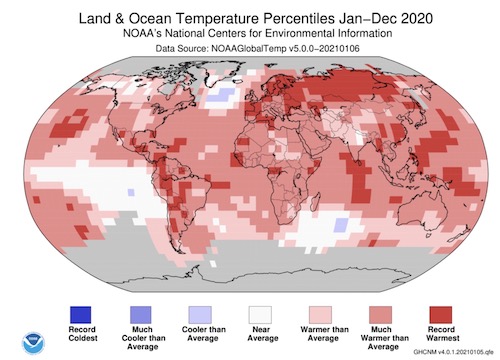
Comment Guidelines
I hope that your contributions will be an important part of this blog. To keep the discussion productive, please adhere to these guidelines or your comment may be moderated:
- Avoid disrespectful, disparaging, snide, angry, or ad hominem comments.
- Stay fact-based and refer to reputable sources.
- Stay on topic.
- In general, maintain this as a welcoming space for all readers.



